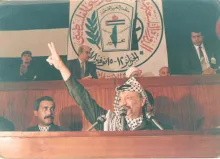35 years ago Yasser Arafat read the Palestinian Declaration of Independence in Algiers
On 15 November 1988, 35 years ago, Yasser Arafat read out in Algiers the Palestinian Declaration of Independence, written by the poet Mahmoud Darwish and just approved by the Palestinian National Council, meeting in exile: “The Palestine National Council hereby declares, in the Name of God and on behalf of the Palestinian Arab people, the establishment of the State of Palestine in the land of Palestine with its capital at Jerusalem (Al-Quds Ash-Sharif).”
The Declaration continues: “The State of Palestine shall be for Palestinians, wherever they may be therein to develop their national and cultural identity and therein to enjoy full equality of rights. Their religious and political beliefs and human dignity shall therein be safeguarded under a democratic parliamentary system based on freedom of opinion and the freedom to form parties, on the heed of the majority for minority rights and the respect of minorities for majority decisions, on social justice and equality, and on non-discrimination in civil rights on grounds of race, religion or colour or as between men and women, under a Constitution ensuring the rule of law and an independent judiciary and on the basis of true fidelity to the age-old spiritual and cultural heritage of Palestine with respect to mutual tolerance, coexistence and magnanimity among religions.”
The Declaration derives its legitimacy from the UN resolution that partitions Historic Palestine: “Despite the historical injustice done to the Palestinian Arab people in its displacement and in being deprived of the right to self-determination following the adoption of General Assembly resolution 181 (II) of 1947, which partitioned Palestine into an Arab and a Jewish State, that resolution nevertheless continues to attach conditions to international legitimacy that guarantee the Palestinian Arab people the right to sovereignty and national independence.”
At the end of the reading of the declaration, Arafat, in his capacity as Chairman of the PLO, assumed the title of President of Palestine. In April 1989, the PLO Central Council elected Arafat as the first President of the State of Palestine.
Diplomatic recognition
This declaration was a turning point in the history of the Palestinian national liberation movement: the Palestine Liberation Organisation (PLO) implicitly confirmed Palestinian acceptance of the two-state solution to the decades-long Israeli-Palestinian question.
The State of Palestine was recognised by 77 UN member states in the month following the proclamation of independence, joined by a further 13 countries in the following twelve months. Today, the State of Palestine is recognised by 138 UN member states, including eight members of the European Union, and by the Holy See.
In December 2014, the Portuguese Parliament passed a non-binding resolution calling on the government to recognise Palestine as an independent state, with only 9 of the 230 MPs opposing the measure. To date, Portugal has not recognised Palestine.
However, Portugal maintains diplomatic relations with Palestine, having elevated the head of the Palestinian Diplomatic Mission to the rank of Ambassador in 2010. Portugal opened a diplomatic representation in Ramallah in 1999.
An occupied and violated state
In the thirty-five years since the declaration of independence was read, as in previous decades, the Palestinian territory has never ceased to be under occupation and its people subject to the violence of the occupier—be it the British coloniser or the Israeli coloniser. But perhaps never, as today, has the aggressor’s degree of inhumanity been so bestial. And this is reflected in the message from Mahmoud Abbas, the President of the State of Palestine, marking the anniversary:
“I address you today, on the anniversary of the Declaration of Independence, and together we face a barbaric war of aggression and an open war of genocide against our people in the Gaza Strip and the West Bank, including Jerusalem, our eternal capital, and a massacre carried out by the occupying state before the world, in order to break our will and uproot our national presence in our land, the land of our fathers and grandfathers, in which our people have lived for more than six thousand years.
The unjust and aggressive war to which we are exposed is a war against Palestinian existence and Palestinian national identity. The identity of the land and the identity of humanity, and it is an episode in the series of aggressions that have been going on for more than a century. It is also a shame in the face of those who support this aggression and give it political and military cover. They are the remains of our children, torn apart by the missiles of this Israeli aggression, and the blood of our women. Our men, whose hopes and lives are being murdered by the missiles of the attacking army, will be a curse for the occupation and for those who support it or remain silent about the war crimes it commits against our people in the Gaza Strip, the West Bank and Jerusalem.”
In the image: Yasser Arafat declares in Algiers the creation of the State of Palestine (Photo WAFA)

